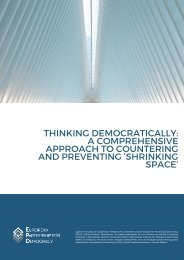Repression and resilience: Diagnosing closing space mid-pandemic
You also want an ePaper? Increase the reach of your titles
YUMPU automatically turns print PDFs into web optimized ePapers that Google loves.
REPRESSION AND RESILIENCE: DIAGNOSING CLOSING SPACE MID-PANDEMIC<br />
21<br />
an irregular situation, as well as refugees <strong>and</strong> asylum<br />
seekers awaiting deportation or held in immigration<br />
detention facilities, who are being confined for longer<br />
periods or str<strong>and</strong>ed in another country due to COVID-<br />
19. 57 Unstable financial situations <strong>and</strong> the struggle to<br />
access government assistance are exacerbating these<br />
groups’ precarious existence. A recent multi-country<br />
survey found that nearly one third of respondents had<br />
to borrow more money than before the p<strong>and</strong>emic, <strong>and</strong><br />
nearly 73% of respondents have cut the number of meals<br />
for their household since the beginning of the p<strong>and</strong>emic. 58<br />
The Roma community struggled with similar problems<br />
regarding subpar living st<strong>and</strong>ards. 59 Anti-Gypsyism <strong>and</strong><br />
hate speech blaming them for the increase in COVID-19<br />
cases translated into a number of violent incidents. 60<br />
of certain communities - particularly activists, women,<br />
refugees, LGBTI people <strong>and</strong> certain minorities - is an<br />
often used tactic for <strong>closing</strong> civic <strong>space</strong>, as part of a<br />
broader attack on democratic <strong>space</strong>. 64 By stigmatising<br />
certain communities <strong>and</strong> silencing them with violence <strong>and</strong><br />
harassment, ruling elites limit <strong>space</strong> for participation <strong>and</strong><br />
contestation for these people, breaching the principle of<br />
equality <strong>and</strong> minority protection that is so fundamental<br />
to democracy. As the p<strong>and</strong>emic disproportionately<br />
affected women, minorities <strong>and</strong> vulnerable populations<br />
around the world, it highlighted the failure of democratic<br />
states to sufficiently protect these populations. The lack<br />
of gender-sensitive <strong>and</strong> minority-supporting p<strong>and</strong>emic<br />
measures across the globe testifies to the lack of political<br />
will to uphold democratic <strong>space</strong> for all citizens.<br />
Persons with disabilities have experienced a worsening<br />
of existing social isolation <strong>and</strong> exposure to violence,<br />
harassment, <strong>and</strong> other human rights violations. 61 Their<br />
overrepresentation in the informal sector puts them<br />
at increased risk of poverty. 62 Persons with disabilities<br />
are more likely to get COVID-19, be unable to follow<br />
prevention measures, <strong>and</strong> see their access to essential<br />
assistance <strong>and</strong> information curtailed. The p<strong>and</strong>emic’s<br />
pressure on healthcare systems worldwide means<br />
that persons with disabilities also face discrimination<br />
in accessing life-saving procedures - with rationing<br />
decisions being based on assumptions about the quality<br />
or value of life of disabled patients. 63<br />
While the adverse impact of the p<strong>and</strong>emic on these<br />
populations may not be the result of a proactive attack,<br />
the passive complacency of most governments with the<br />
systemic inequalities <strong>and</strong> discrimination highlighted by<br />
the p<strong>and</strong>emic is just as harmful to democratic <strong>space</strong>. The<br />
setback in women’s socio-economic progress <strong>and</strong> the<br />
acute needs <strong>and</strong> insecurities of minorities <strong>and</strong> vulnerable<br />
populations will limit their opportunities for participating<br />
in public life <strong>and</strong> decision-making at all levels. This will<br />
greatly affect these populations’ ability to shape postp<strong>and</strong>emic<br />
recovery policies, which will further perpetuate<br />
a cycle of exclusionary <strong>and</strong> discriminatory policies in the<br />
long run.<br />
Exclusion <strong>and</strong> democratic <strong>space</strong><br />
Research has shown that the silencing <strong>and</strong> disregard<br />
The ability of governments to “build back better” - the<br />
catchphrase for p<strong>and</strong>emic recovery plans in Europe - will<br />
depend on the proactive efforts made to involve women<br />
57 UN ESCWA (2020): Impact of COVID-19 on Migrants <strong>and</strong> Refugees in the Arab Region. Available here.<br />
58 Norwegian Refugee Council (2020): Downward Spiral: The economic impact of COVID-19 on refugees <strong>and</strong> displaced people. Available<br />
here.<br />
59 European Centre for Minority Issues (2020): ECMI Minorities Blog: The Impact of COVID-19 on Roma Communities in Non-EU Countries<br />
in Eastern Europe. Available here.<br />
60 European Union Agency for Fundamental Rights (2020): Coronavirus p<strong>and</strong>emic in the EU - Impact on Roma <strong>and</strong> Travellers. Available here.<br />
61 OHCHR (2020): COVID-19 <strong>and</strong> the Rights of Persons with Disabilities: Guidance. Available here.<br />
62 International Labour Organization (2020): COVID-19 <strong>and</strong> the World of Work: Ensuring the inclusion of persons with disabilities at all stages<br />
of the response. Available here.<br />
63 United Nations (2020): Policy Brief: A Disability-Inclusive Response to COVID-19. Available here.<br />
64 Amnesty International (2019): Laws designed to silence: the global crackdown on civil society organizations. Available here.

















